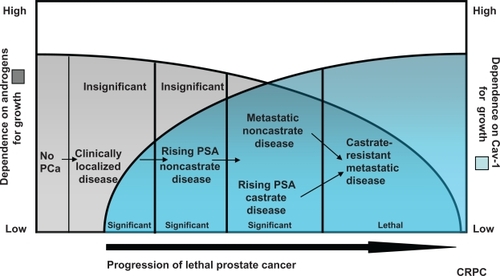Figures & data
Table 1 Rationale for developing caveolin-1 as a biomarker for clinically significant prostate cancer
Figure 1 The clinical utility of Cav-1 as a biomarker reflects its biologic contribution to malignant progression. Prostate cancer disease states reflecting the development of lethal disease (x-axis) are depicted in relation to dependence on androgens (left y-axis: from high to low) for growth and increased dependence on Cav-1 for growth (right y-axis: from low to high).Citation29 Malignant progression is associated with reduced dependence on androgens (from high to low) and increased dependence on Cav-1 for growth (from low to high). Serum Cav-1 is a useful biomarker to distinguish clinically significant from insignificant localized disease. It is also anticipated that serum Cav-1 will be a clinically useful biomarker for other prostate cancer disease states. For example, Cav-1 levels may help identify which patients with PSA-only recurrent disease require aggressive therapy, and which patients with castrate-resistant disease respond to systemic therapy.
Abbreviations: Cav-1, caveolin-1; PSA, prostate-specific antigen.
